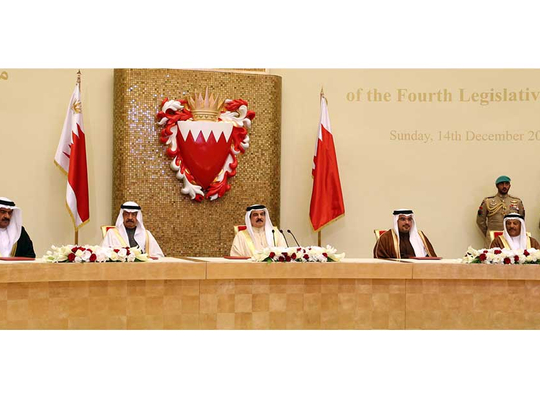
Manama: King Hamad Bin Eisa Al Khalifa has reiterated Bahrain’s commitment to promoting security and sound international relations and to fighting terrorism and extremism.
“The Kingdom of Bahrain has been, and will be, extending its hand for cooperation and peace to all the countries, and it will always call for international relations, based on mutual respect and non-interference in the domestic affairs of the other states,” King Hamad said as he addressed the first session of the newly elected parliament.
“This requires, at this phase, that we preserve peoples’ stability and progress, fight extremism and terrorism that hamper the construction process and destroys the future of the nations. In this context, we do commend the parliament’s recommendations with regard to the fight against terrorism in all its forms and drying up its funding sources. We also affirm our readiness to continue supporting the international efforts to reinforce security in the region, a highly significant matter for the world’s stability and peace,” he said.
Bahrain, a financial and banking hub in the Middle East and North Africa, last month hosted the “Manama Conference on Combating Terrorism Funding” that brought together representatives of more than 30 countries and top international organisations to discuss measures to bar terrorist groups from raising funds through various institutions across the Middle East and North Africa.
The kingdom also won praise earlier this month at the Manama Dialogue from senior international officials who applauded its contributions in the fight against terrorist groups.
In his address, King Hamad stressed that Bahrain was “keen on moving forward with the Gulf Cooperation Council in order to achieve further integration and heading seriously towards the union.”
“The agreement of Riyadh and the Riyadh supplementary agreement that have been signed in Riyadh recently, will give our union more strength and power,” King Hamad said, referring to two accords signed in the Saudi capital in April and November to iron out diplomatic divergences and move towards the union of the member states.
The GCC, formed in 1981, comprises Bahrain, Kuwait, Oman, Qatar, Saudi Arabia and the United Arab Emirates.
A call to move from the phase of cooperation to a union was issued by Saudi King Abdullah Bin Abdul Aziz Al Saud in December 2011. The call was welcomed by the member states, but some of them requested more time to study the finer details.
“Therefore, we express our appreciation of the great role by the Custodian of the Two Holy Mosques, King Abdullah Bin Abdul Aziz Al Saud and our brothers, the GCC leaders, who have been keen to reach this [ Riyadh] agreement which is to the advantage of all the citizens of the brotherly GCC States,” he said.
“With regard to the economic integration and union between the GCC countries, we reiterate our support to what have been achieved, and we are also confident that construction work on the project of the King Hamad Causeway with Saudi Arabia will include railway transport services to Bahrain.
“It will be an anchor to achieve integration, encourage investment and trade for further economic and social unity, and enhance the policy of linking the GCC states in all fields of interest to the nation and citizens, which in the end will benefit, and achieve prosperity to, all the peoples of our countries.”
King Hamad said that all Arab countries in fact should set aside differences and work out on reaching agreements.
“The present situation requires, more than at any time before, that all Arab countries are in agreement and that they overcome any differences to maintain the Arab entity as an effective regional power under the umbrella of the Arab League,” he said.
Arabs should “work on the existing ties between their people, bolster cooperation and common interests between them, especially that the slow pace of recovery of the global economy requires the speeding up of the implementation of effective economic and financial policies, providing structural reforms that support growth, and create further job opportunities.”
“The decision of establishing the Arab Human Rights Court enhances the status of Arab countries at the international level, and here we also call on the international community to foster cooperation and joint work in order to find the appropriate approach to these pressing issues that will support our common goals for a strong and comprehensive global economic growth,” King Hamad said.
The Bahraini monarch said Palestine would remain the most significant cause.
“We affirm the importance of finding a just, lasting and comprehensive solution to ensure the legitimate rights of the Palestinian people for the establishment of an independent Palestinian State with Al Quds as its capital,” he said.












